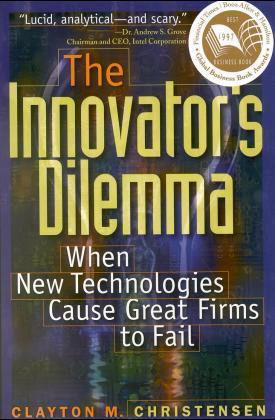 Zusammenfassungen
Zusammenfassungen
 Why well-run companies—specifically the well-run ones—are particularly susceptible to being destroyed by upstart outfits hitching their wagon to new and disruptive technologies. The message is to make your own best products obsolete with innovative ones before the competition can.
Why well-run companies—specifically the well-run ones—are particularly susceptible to being destroyed by upstart outfits hitching their wagon to new and disruptive technologies. The message is to make your own best products obsolete with innovative ones before the competition can. The Innovator's Dilemma demonstrates why outstanding companies that had their competitive antennae up, listened astutely to customers, and invested aggressively in new technologies still lost their market dominance. Drawing on patterns of innovation in a variety of industries, the author argues that good business practices can, nevertheless, weaken a great firm. He shows how truly important, breakthrough innovations are often initially rejected by customers that cannot currently use them, leading firms to allow their most important innovations to languish. Many companies now face the innovator's dilemma. Keeping close to customers is critical for current success. But long-term growth and profits depend upon a very different managerial formula. This book will help managers see the changes that may be coming their way and will show them how to respond for success. The Management of Innovation and Change Series.
The Innovator's Dilemma demonstrates why outstanding companies that had their competitive antennae up, listened astutely to customers, and invested aggressively in new technologies still lost their market dominance. Drawing on patterns of innovation in a variety of industries, the author argues that good business practices can, nevertheless, weaken a great firm. He shows how truly important, breakthrough innovations are often initially rejected by customers that cannot currently use them, leading firms to allow their most important innovations to languish. Many companies now face the innovator's dilemma. Keeping close to customers is critical for current success. But long-term growth and profits depend upon a very different managerial formula. This book will help managers see the changes that may be coming their way and will show them how to respond for success. The Management of Innovation and Change Series. Dieses Buch erwähnt ...
Dieses Buch erwähnt ...
 Personen KB IB clear | Daniel Kahneman , Amos Tversky | ||||||||||||||||||
 Begriffe KB IB clear | Dilemma
,  Innovation Innovation innovation
, innovation
,  Management Management management
, survival of the fittestsurvival of the fittest
, management
, survival of the fittestsurvival of the fittest
,  Technologie Technologie technology technology
| ||||||||||||||||||
 Bücher |
| ||||||||||||||||||
 Texte |
|
 Einträge in Beats Blog
Einträge in Beats Blog
 Zitationsgraph
Zitationsgraph
 Zitationsgraph (Beta-Test mit vis.js)
Zitationsgraph (Beta-Test mit vis.js)
 Zeitleiste
Zeitleiste
 18 Erwähnungen
18 Erwähnungen 
- The Invisible Computer - Why Good Products Can Fail, the Personal Computer Is So Complex and Information Applicances Are the Solution (Donald A. Norman) (1999)


- Disruption in Education (Clayton Christensen, Sally Aaron, William Clark) (2002)


- Radical Evolution - The Promise and Peril of Enhancing Our Minds, Our Bodies - and What It Means to Be Human (Joel Garreau) (2006)

- Das Management der Ignoranz - Nichtwissen als Erfolgsfaktor (Ursula Schneider) (2006)

- How the Body Shapes the Way We Think - A New View of Intelligence (Rolf Pfeifer, Josh Bongard) (2006)

- Coolhunting - Chasing Down the Next Big Thing (Peter A. Gloor, Scott Cooper) (2007)
- International Handbook of Information Technology in Primary and Secondary Education (Joke Voogt, Gerald Knezek) (2009)
- Googled - The End of the World As We Know It (Ken Auletta) (2009)

- Das strategische Management von Contentrechten - Schlüsselherausforderung für audiovisuelle Medienunternehmen (Ulrich Schaal) (2010)

- Internet - Segen oder Fluch (Kathrin Passig, Sascha Lobo) (2012)


- 5. Disruption ist kein Kindergeburtstag - Vom Entstehen und Vergehen

- 5. Disruption ist kein Kindergeburtstag - Vom Entstehen und Vergehen
- Erfolgreich publizieren im Zeitalter des E-Books - Ein pragmatischer und zielorientierter Leitfaden für die Zukunft des digitalen Buches (Stephen Fedtke, Lisa Reinerth) (2012)

- 1. Erfolgreich Publizieren im Zeitalter des E-Books (Marcel Weiß)

- 1. Erfolgreich Publizieren im Zeitalter des E-Books (Marcel Weiß)
- Das Neue und seine Feinde - Wie Ideen verhindert werden und wie sie sich trotzdem durchsetzen (Gunter Dueck) (2013)


- Silicon Valley - Was aus dem mächtigsten Tal der Welt auf uns zukommt (Christoph Keese) (2014)


- Wirtschaftsbürger in einer digital geprägten Welt - Curriculare Integration ökonomischer Medienbildung auf der Stufe Sek II (Gymnasium) im Fach "Wirtschaft und Recht" (Nina Scheffler) (2018)


- Digitaler Kapitalismus - Markt und Herrschaft in der Ökonomie der Unknappheit (Philipp Staab) (2019)


- Metaphors of Ed Tech (Martin Weller) (2022)


- Why Google Missed ChatGPT (Alex Kantrowitz) (2022)


- Education for the Age of AI (Charles Fadel, Alexis Black, Robbie Taylor, Janet Slesinski, Katie Dunn) (2024)

 Co-zitierte Bücher
Co-zitierte Bücher
 Volltext dieses Dokuments
Volltext dieses Dokuments
 Bibliographisches
Bibliographisches 
 Beat und dieses Buch
Beat und dieses Buch
Beat hat dieses Buch während seiner Zeit am Institut für Medien und Schule (IMS) ins Biblionetz aufgenommen. Beat besitzt kein physisches, aber ein digitales Exemplar. (das er aber aus Urheberrechtsgründen nicht einfach weitergeben darf). Aufgrund der wenigen Einträge im Biblionetz scheint er es nicht wirklich gelesen zu haben. Beat hat dieses Buch auch schon in Blogpostings erwähnt.






















 Biblionetz-History
Biblionetz-History